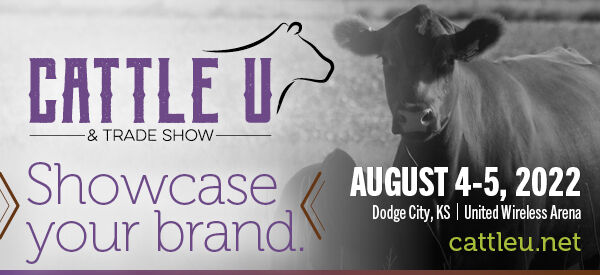In challenging times, beef producers are looking for an edge and genetics, nutrition and production are all part of the equation.
Finding the balance is the key for producers, according to Frank Goedeken, was one of the speakers at the first Cattle U and Trade Show, a High Plains Journal event July 29 to 30, at the United Wireless Arena in Dodge City, Kansas.
Goedeken has been a consulting nutritionist in the High Plains since 1989, including 15 years at Purina Mills and as an owner of Integrated Beef Consultants LLC. Priorities of his practice have been gain, conversion, cost of gain and out weight.
The challenge for producers continues to be to bring these advances together without compromising cattle health, properly growing and developing the cattle are required to reverse the trend of increased death loss and medicine costs.
As he visits with clients one of his goals is to not only look at the facility where the calves are located but also to help them envision the final product so the consumer has an enjoyable eating experience. He noted it all starts with the calves and all phases, from the cow-calf producer, to the backgrounder to the feeder all need to be on the same page.
“If you talk to most feedyards and say, ‘You’re going to bring in 100 calves that are being weaned on the truck?’ He’s not going to be very happy,” Goedeken said. “Why is that? Health is going to be an issue. So you’re trying to improve the health of the cattle with good nutrition and good management.”
At the same time producers need to keep tabs on feed costs and commodity prices, he said.
A cow-calf producer also needs to study the genetics of his herd and how the calves perform beyond the boundaries of the ranch, Goedeken said.
From his observations, Goedeken has noticed the comfort level of cattle is not always tied to feed. Good questions producers need to ask include do the cattle have the right pens and configurations? Should the producer do something different?
Sometimes the right environment for the cattle can make a big difference, too.
“Have you ever noticed that cattle do not like to lay on bare dirt? You go out in your pasture, wheat stubble or whatever,” he said. “Very seldom would you see him or her lay on bare dirt. If you put some hay down or some straw out there they’d all be laying down. So that’s kind of what we start with.” Providing a comfortable environment is important.
Paying attention to nutrition is essential because of the life stages and physiological needs of the animal changes as they grow and mature and wrong decisions can even cause death to a young animal, he said.
Managing stress
Managing stress for the calf is also important, the consulting nutritionist said. A new environment can be a factor others may seem trite but are important, too, such as the water may taste different or the calf’s mother is no longer with her calf. Goedeken said sometimes with all the stress, it can be wrongly assumed that all the calves are under stress. “Then we run through, shoot, tag them and vaccinate.”
He said, on the surface, it sounds like the right approach but it does not mean the situation was managed best for the cattle.
“The more we stress the cattle the less likely they are to respond to challenges to their immune system,” he said. “They are less likely to respond to vaccines and the less likely they are to be healthy their entire life.”
He also noted that timing of vaccines can make a difference and working with veterinarians is essential.
Sign up for HPJ Insights
Our weekly newsletter delivers the latest news straight to your inbox including breaking news, our exclusive columns and much more.
Balance
Nutritional stress occurs while trying to get those animals quickly up to speed to meet delivery needs but he says energy has to be balanced with health of the animals. In making a point he says distillers grain is an example in which feeders thought was a “magic bullet” but he says studies show the key remains balance in feeding nutrients.
A healthy animal means he is less likely to be stressed as a more stressed animal means more medication is needed, Goedeken said. Also, immune functions might become compromised and that can lead to unexpected death.
In looking at nutritional matters, he said striving to get to the right level of energy, protein and other nutrients in the diet does pay. Supplementing the diet with zinc can help producers because zinc is tied to muscle development and immune functions.
“Stress negatively affects health and performance. As an industry, we need to pay more attention to that. When I grew up in the business I thought, ‘Man, let’s get all that stress over with, let’s process them and let’s get them into their pens?’ But it may not have been the right time to process those cattle based on what we talked about.”
Healthier cattle perform better, he said, and that dynamic has not changed and much more information is available with studies to back it up.
Dave Bergmeier can be reached at 620-227-1822 or [email protected].



